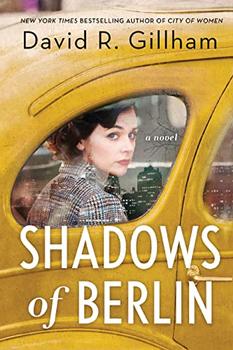Summary | Excerpt | Reading Guide | Discuss | Reviews | Beyond the Book | Readalikes | Genres & Themes | Author Bio

A Novel
by David R. Gillham
In the bedroom, while the ambient fuss of street traffic drifts up from below, the bedside lamps are switched off. Rachel and Aaron climb under the blankets. But it's immediately obvious that Aaron is interested in pursuing a little something other than the nightly routine of good-night pecks. The smell of him as he pulls her closer can still intoxicate her, even after five years of marriage. The feel of his skin, the hair on his chest, that head of thick russet curls. It's easy for her to lose herself. The small ceramic night-light she bought for twenty cents at the hardware store is plugged into the electrical outlet under the window, and every night, she snaps it on because she cannot tolerate total darkness. In total darkness, she will drown. So the night-light glows like a petite yellow star.
Aaron has opened her pajamas. The blue silk pajamas he bought in Chinatown for their fifth anniversary, though probably picked out by his sister Naomi. Still, they are so luxurious. She slides her fingers through his hair as his lips brush her skin. His hand moves slowly, gently, as he slips the Chinese silk from her hips. Exposed, on top of the blankets, she feels the vulnerability of her body deepen. His lips find the curve of her neck. She kisses his ear, her desire tightening.
"Aren't we forgetting something?" she whispers softly. "Aren't we forgetting something?" But he doesn't answer. His hands are moving. His mouth. She can feel herself warming, her breath expanding. A void opening. But when she whispers his name, she is still repeating her drowsy question. "Aaron? Aaron? Aren't we? Aren't we forgetting something?"
Aaron's answer is to shift her body under him, and she feels a liquid craving, but also an edge of fear. Doesn't the Talmud teach that the obligation to be fruitful and multiply is on the man? So siring children is a mitzvah for the husband, which has contributed to Aaron's disdain of condoms. And Rachel would rather be in control of the process anyway. Women have more leeway. So she whispers sensibly, intimately. "Aaron, I don't have my shield."
She means her diaphragm. A word she mispronounces enough to elicit an indulgent correction: Die-a-fram, says Aaron. Like die-a-thousand deaths. Not dee-a-fram. So instead of die-a-thousand-deaths diaphragm, she calls it her shield, because that's what it is, isn't it? Her shield to keep her safe from her own body. She can slip through Eve's loophole and escape her own biology. Her own history. "Aaron…"
"Would it be so terrible, honey?" her husband wants to know. "Would it be so terrible if we made love like man and wife? Think of Ezra Weinstock," he tells her. "He has three little Weinstocks already, with a fourth in the hopper."
"Aaron."
"My own cousin, that fucknik Ezra, is ahead of me, Rachel. Ezra Weinstock from Coney Island Avenue, so fuckin' smart that, when he was ten, he stuck a pencil up his nose—is ahead of me. Do you know what that's doing to my mother? Every Wednesday, she's playing mah-jongg with Aunt Ruth, and oy what an earful she gets about the adorable Weinstock grandkids. How much longer can the woman stand the disgrace? She'll have to adopt a different son."
Rachel absorbs the smile in his voice. The spreading warmth of his touch. "Aaron," she repeats.
"She'll have to replace me with Hilda Auerbach's boy. He's a doctor now with his own practice in Prospect Heights. An eye-ear-nose-and-throat man." He is saying this in the funny way, kissing her belly button and breasts once for each specialty: eye, ear, nose, throat. But Rachel can tell that he is also deadly serious. How can he face the world as a man? How much longer can he face himself with no children? Without that gift from his lovely wife? Time is running out.
He is moving into her. Pressing his advantage, exploiting her weakness for him, and she is feeling her resolve melt. "I can't" is all she manages to say, but it's tough to win this debate in the closeness of their room, in the sweetness of their bed. Words are slipping away from her. Sometimes, she thinks that she should just let him be fruitful. Let him cook up a baby inside her. Put a bun inside her oven. Their bun. But then the elevated West Side freight line roars past, and something in the unrelenting thunder from those tracks panics her. Trains lead to death.
Excerpted from Shadows of Berlin by David R. Gillham. Copyright © 2022 by David R. Gillham. Excerpted by permission of Sourcebooks. All rights reserved. No part of this excerpt may be reproduced or reprinted without permission in writing from the publisher.
Your guide toexceptional books
BookBrowse seeks out and recommends the best in contemporary fiction and nonfiction—books that not only engage and entertain but also deepen our understanding of ourselves and the world around us.